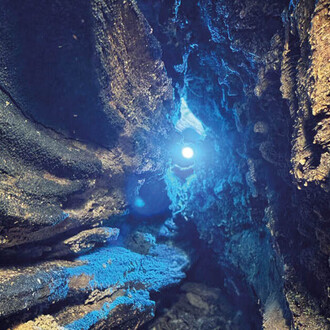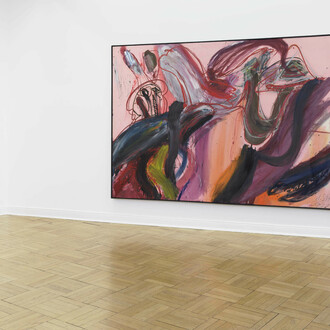The breath slows as we approach the courtyard where super bien! Berlin is located.
Our watching embraces the surroundings, and a second detailed look is predictable, admiring the silent serenity, but also the incoherence of the unusual contradiction. A enormous glass structure of brutal sincerity that doesn't hide what is visible inside, a big window without filters, references or premises. The naturalness exposed to the transparency of the eyes.
The purpose as a greenhouse is understandable considering super bien! structure. Perhaps that’s why the current function — as a space for contemporary art exhibitions— makes it so special and surprising. The principle of design and construction is to achieve functionality, but there's also something inborn to the attribution of a form. Rules, models, and restrictions shape the size and materialization of a space. It’s almost a general truth that everything has (or should have) a function, a purpose, and beyond all, the onus to be explainable as such.
I suddenly remember the conversations I had with Arturo Comas about his trip to Japan. He was delighted by the culture and contemplative meditation - with which he develops an empathetic identification. He invests a special and permanent interest in his artistic practice, developing some complex concepts without a productive logical connection. With the installation of a karesansui (Zen garden) inside super bien! in addition to automatically rescuing the original function of the greenhouse, Comas invites us to contemplation, to stop and reflect, to reinvent and re-cognize. Without this contemplative dimension, we are subject to the uncontrolled cascade of productive hyperactivity. The sculptural objects related to gardening and strangely placed in the surface field of undulating sand remind us of the non-existence of plants. And unexpectedly, we enter in a trance of indolence and leisure. The exhibition title Greenhouse sunday, reminds us the day dedicated to leisure (on the calendar, Sunday), a kind of catatonic pause in a society where gardening is a catharsis practice.
This lethargic condition —so rare in 21st-century society— generates another concern: the usefulness of contemplation. The artist shares the ideologies of Nuccio Ordine's reflection and the importance of apparent knowledge that does not produce material benefits. The crushing cylinder of utilitarianism tears down the soul's feed. Wisdom is found in unexpected places, as is the beauty of things that don't generate immediate profit.
In Arturo Comas's installation Greenhouse sunday, we find a subtle yet broad combination of concepts confined in a glass structure. There's the desire for the inaccessible —to get close to the installation—, the frustration of impossibility, the excitement of stillness, and also its sharp cheerfulness. This display projects itself as the image of a small glass bottle containing something very tender that we might keep as a artefact, a treasure. It's an amulet we would look at in moments of hopelessness and incomprehension, and also because, "if you don’t not understand the usefulness of the useless and the uselessness of the useful, you will not understand art."
(Text by Mercedes Cerón)












